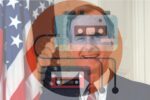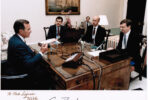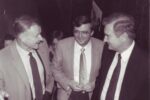Reportaż Tadeusza Lipienia, szefa sekcji polskiej Glosu Ameryki z wizyty wiceprezydenta USA George H. W. Busha w Krakowie 29 września 1987 r.
The report is in Polish and English.
In 1987, the U.S. Department of State upgraded the status of the Consulate in Krakow, designating it as a Consulate General. On September 29, 1987, visiting U.S. Vice President George H.W. Bush led a designation ceremony and spoke about the strength of U.S.-Polish ties, especially ties with Southern Poland. He also spoke about his visit earlier that day to the Nazi Concentration Camp at Auschwitz. Vice President Bush’s visit to Auschwitz, his visit to Krakow, the designation of the Consulate General, and a visit to the Polish-American Children’s Hospital in Krakow were major public diplomacy events while Poland still had a communist government.
This report was prepared by the Voice of America (VOA) Polish Service director and correspondent Ted Lipien who covered the 1987 visit to Poland by Vice President Bush.
Vice President George H.W. Bush: “It is my great pleasure to be in this beautiful city today, to participate in this ceremony, which raises our mission here to the Consulate General level.
This mission symbolizes American presence, not just in Krakow, but in all of southern Poland which is the ancestral home of many millions of Americans of Polish descent.
This city has long played a central role in the history of Poland and the Polish people. And when one sees the magnificent architecture with which the Polish kings embellished the city, it’s easy to recall that Krakow was once the capital of Poland. In her monuments and art, she remains a royal city.
But the contrast — these achievements and culture, civilization — stand in stark contrast to the barbarism evidenced by the Nazi death camp at Auschwitz which we visited this morning.
The brutal and tragic horrors of Auschwitz serve as grim reminder of man’s capacity for evil.
The denial of human rights, the denial of human dignity leads ultimately to this: the attempted extermination of an entire people.
As Eli Wiesel said to me last week just before I left on my trip, not all the victims were Jews, but all the Jews were victims.
At the end of this Nazi slaughter, six million Jews were dead. Thank God it didn’t succeed completely.
Thank God courageous Poles, risking the lives of themselves and their families, sheltered tens of thousands of Jews from their Nazi enemies. Many of them paid the ultimate price for their courage and humanity.
Hundreds of thousands of Christians met their ends in the awful death camps we paid solemn witness to this morning.
Today we saw the cell of Father Maximilian Kolbe who sacrificed his life for that of a fellow prisoner and was canonized by the Catholic Church.
Let’s all pledge today our eternal vigilance that crimes of this magnitude will happen never again, for it’s been written that in remembrance lies the secret of redemption.
On this trip to your country, Mr. President (Krakow’s mayor) we’ve sought to strengthen the long and cordial ties between the Polish and American people, ties that date to the very birth of the United States.
At the time of the American Revolution, Polish patriots crossed the dangerous ocean to offer their assistance to a people struggling to free themselves from foreign domination.”

Tadeusz (Ted) A. Lipień jest ekspertem ds. mediów, dziennikarzem, pisarzem, blogerem i orędownikiem wolności prasy. Pracuje w mediach przez ponad 50 lat, zaczynając jako spiker radiowy w Głosie Ameryki w 1973 r. W 2020-2021 był prezesem Radia Wolna Europa/Radia Swoboda. W Głosie Ameryki, Lipień pisał reportaże po polsku i angielsku o wydarzeniach w Polsce i w innych krajach Europy Wschodniej, zostając szefem sekcji polskiej w 1982 r. podczas walki NSZZ „Solidarność” o demokrację. Przeprowadził wywiady z wiceprezydentem George'em H. W. Bushem (przyszłym prezydentem USA), kardynałem Karolem Wojtyłą (przyszłym papieżem Janem Pawłem II), przywódcą Solidarności Lechem Wałęsą (przyszłym prezydentem Polski) i wieloma innymi działaczami polskiej opozycji demokratycznej, którzy później piastowali najwyższe stanowiska w rządach w Polsce. Po upadku żelaznej kurtyny rozbudował sieć stacji partnerskich Głosu Ameryki i Radia Wolna Europa/Radia Swoboda w Europie Wschodniej, Rosji, Azji Środkowej, Iraku i Afganistanie. Następnie został Dyrektorem Oddziału Eurazji Głosu Ameryki, gdzie rozszerzył programy telewizyjne i multimedialne na Ukrainę i Rosję oraz stworzył multimedialny i wielojęzyczny magazyn opiniotwórczy, „New Europe Review", rekrutując jako doradców byłego prezydenta Czech Václava Havla i byłego doradcę ds. bezpieczeństwa narodowego USA dr. Zbigniewa Brzezińskiego. W 2005 roku został mianowany p.o. zastępcy dyrektora Głosu Ameryki. Otrzymał wiele nagród, w tym nagrodę Pracownika Roku oraz wyróżnienia od dyrektorów Głosu Ameryki, zarówno demokratów, jak i republikanów. Przeszedł na emeryturę w 2006 r. i założył „Free Media Online", organizację pozarządową zajmującą się sprawami wolności mediów, a także był współzałożycielem „Committee for U.S. International Broadcasting", organizacji wspierającej media w krajach dotkniętych cenzurą i naruszeniami prawami człowieka. Jego artykuły na temat mediów były publikowane w „The Hill”, „American Diplomacy Journal", „National Review", „The Washington Times", „Digital Journal" i „The Washington Examiner". Jego poglądy na temat mediów były cytowane przez CNN, NBC, FOX, NPR, „The New York Times", „The Wall Street Journal" i „The Washington Post". Jest autorem wydanej w języku angielskim i polskim książki o papieżu Janie Pawle II. Lipień ukończył z wyróżnieniem studia na George Washington University w Waszyngtonie.






